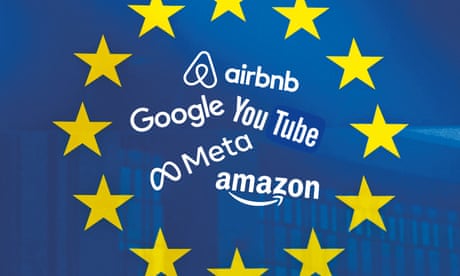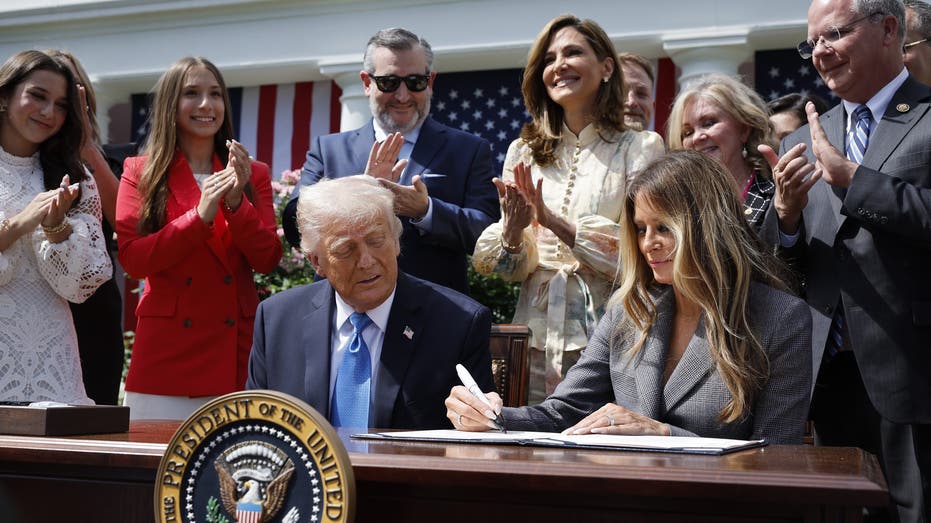- by foxnews
- 23 May 2025
I saw first-hand how the tech giants seduced the EU - and undermined democracy | Georg Riekeles
I saw first-hand how the tech giants seduced the EU - and undermined democracy | Georg Riekeles
- by theguardian
- 29 Jun 2022
- in technology

The tide is seemingly turning against Meta, Google and other tech giants. Groundbreaking new European Union legislation is imminent, aimed at forcing the large digital platforms to do more to keep users safe and cutting down market abuses, data capture and surveillance infrastructure.
As the Digital Services Act package was being finalised, the very public crossing of swords between Elon Musk and the European Commission over Twitter captured headlines. Yet the Musk spectacle was a sideshow.
Much more urgently in need of scrutiny is big tech's hidden lobbying against the DSA. It is unlikely that Brussels has previously seen campaigns on such a scale and practices so out of line with the requirements of a democratic, open society.
The DSA will be rubber-stamped by the European parliament next week. When it finally comes into force this year, it will allow Europe for the first time to neutralise some of the harms caused by social media platforms. But the compromises made in getting here also reflect the extraordinary power of tech companies to influence decision-making, and by extension to subvert our democracies.
We learned from big tobacco how outsized interests create entire ecosystems to influence and manipulate both civil society and policymakers. Based on my experience of and encounters with the big tech platforms from inside the EU over 12 years, I have formed the view that the Brussels policy community has been, and still insidiously is, in the grip of this corporate class - the biggest the world has ever seen.
European competition law was supposedly big tech's greatest fear. But it has patently been either too weak or too ineffectively applied to rein in the Silicon Valley giants. Profit margins as high as Google's (under its parent company Alphabet) and Meta's, hovering at about 30% for a decade, should be prima facie evidence that they have not been facing real competition.
If an incapacity to set limits on the tech platforms were not enough, other entitlements were actually conferred on them. Along with building trillion-dollar empires on reaching into our personal data, the platforms have for more than 20 years enjoyed significant liability exemptions in both European and US law.
How did big tech gain its privileged status, regulatory permissions and such a commanding presence in Europe? Brussels has tough questions to answer. As vital battles in framing "human-centric" artificial intelligence still lie ahead, the self-examination must go deep.
I can provide only an account of where I have come across the tech platforms in Brussels policymaking, but I believe that central to this failure is the question of capture.
In 2010 I arrived at the EC as a member of Michel Barnier's team of advisers. Barnier was commissioner for the internal market, and I was given responsibility for digital single-market issues and intellectual property rights, including copyright reform. For me, the commission was Camelot, a near-mythic force of public policy for European citizens, armed with regulatory powers to take on the unruly interests of the globalised economy. I had a lot to learn about the dark arts of lobbying the EU.
The centrepiece of EU digital single-market legislation was then, and remains, the Electronic Commerce Directive, dating from 2000. Whether by unthinking imitation of the American regulatory approach, lobbying or simply because of early-days internet enthusiasm - or likely a mix of all three - Europe had followed the US. Its rules recognised online intermediaries as "neutral" content distributors, and gave them immunity from liability for the information they hosted - in retrospect, it often seemed, no matter how toxic, indecent or illegal.
By the early 2010s, the exemptions had come to be seen by many in the EU as deeply problematic. Campaigners pleaded with us for more accountability, and against the platforms' self-regulation. They had a duty of care, it was argued. By what logic, after all, were publishers and broadcasters liable and responsible for everything they distributed, but online platforms reaching far more people and making much more money from it, were not. So why did it take the EU more than two decades to act?
There is an inescapable feeling that we let much of this happen because these were US companies. There was in the commission, as elsewhere, a fascination with Silicon Valley. It was both revered and feared.
A dangerous laissez-faire ideology had also come to dominate Brussels' thinking on tech regulation. People wanted to trust that tech was progress, that its leading companies were benevolent, net neutrality and democracy went hand in hand, and that the US regulatory model was the one to emulate. To question this was close to a taboo.
The platform economy had a vigorous champion in Neelie Kroes, in charge of the powerful competition portfolio between 2004 and 2009 and later the digital agenda. She was a formidable opponent of Barnier.
The full story must also include platform-friendly EU governments such as the then member Britain, which privileged strong transatlantic ties and interests. Google had direct links to the Cameron-Clegg coalition government, for instance. In Brussels, Google's influence in London was close to a "fact on the ground". Kroes would go on to join boards of the US tech companies Uber and Salesforce after she left the commission, and Nick Clegg is now, of course, Meta's president for global affairs.
The liability exemptions were not the only internet economy battleground in the commission. Another involved copyright laws. Fierce lobbying came in from all sides, particularly around user-generated content. Should music in videos uploaded by YouTubers be subject to copyright payments and, crucially, should the platforms be obliged to prevent copyright violations? If Europe were not to stifle creativity, user-generated content should simply be exempt from copyright protection, the reformers and their supporters in Kroes's entourage insisted.
When this view ran into resistance, the public debate took a darker twist. Allegations spread that free speech was threatened and even that teenagers could be hunted down in their bedrooms by rights holders or the commission. The reality was more nuanced. The platforms were making colossal advertising profits from content produced for free by users, and content upload filters had been in use for years without choking off user creativity.
I don't remember meeting YouTube directly at the time. Its representatives were, in fact, conspicuously absent. By contrast, well-organised citizens' and stakeholder groups came to put their views as well as canvassing members of the European parliament. At one point, I remember thinking: who are these people? It turned out that the coordinator of one of the most vocal lobbying coalitions in Brussels on digital copyright reform, representing everything from public libraries to digital rights organisations, was also the managing director of a consultancy whose clients included Google, YouTube's owner. To me this looked like big tech "astroturfing" (where the real sponsors of a message are concealed by making it look as if it's come from the grassroots.) Even if not, there was surely a public interest in asking if Google had influenced this coalition's campaigning.
The tech industry had other ways of imperceptibly swaying opinion in Brussels. Invitations would arrive to visit Google's offices, or to experience its latest innovation. The bait at the time could be Google's self-driving car, or an offer to try out Google Glass. It was the perfect, cool, lunchtime bowl of oxygen for many in Brussels eager to keep up with the new frontiers of technology. The fun and games didn't stop there. Conferences were held in interesting spaces, usually homing in on fascinating science or engineering stories. EU officials and politicians - from heads of cabinets and director generals to MEPs - went by the dozen. Google's tactic was as simple as its pockets were deep: through hospitality, create a positive link, thick or thin, with as many people of power as possible.
In 2016, by which time I had moved to the EU's Brexit negotiation taskforce, the commission finally proposed the directive on copyright in the digital single market. In early 2019, as the legislation was entering the final stages of debate, huge street protests took place across Europe, millions signed petitions, and MEPs were bombarded by emails warning against agreeing to anything that would "chill" online expression.
In the end, the commission prevailed. The copyright directive took effect across Europe a year ago. I leave it to others to judge on the substantiation of Google's dramatic warning that it would "change the web as we know it".
Fast forward to now, and history, it seems, is repeating itself. The Digital Services Act marks the end of the platforms' vast liability exemptions and their seeming impunity. It will impose more transparency on the platforms' content moderation and set rules on so-called dark patterns, design features that can trick users into doing things they didn't mean to.
But it's still only a first pass at how to deal with the many complex uses of artificial intelligence and the platforms' recommender systems that determine not only our commercial choices but the information we get and how we see the world.
Vast sums are at stake. Fourth-quarter revenues in 2021 at Google's parent, Alphabet, jumped by more than 30%, thanks - acccording to the FT - to AI "enhancements that had improved the underlying effectiveness of the company's ads".
No wonder that one of the biggest battles around the new EU legislation related to the behavioural or tracking advertising that underpins the tech platforms' business success: the so-called surveillance capitalism model.
Concerned about the democratic threat posed by revenue-driven data collection and micro-targeted ads, a group of MEPs organised a Tracking-Free Ads Coalition, arguing for much stricter curbs than those the commission had originally proposed.
The counter-mobilisation was massive, and it came from an unexpected quarter: Brussels had never seen so many small and medium-sized business and startup organisations turn up to lobby. SMEs, it was claimed, would suffer most from a ban on tracking ads.
Let's have a closer look at some of the groups that lobbied hardest. Allied for Start-Ups was a prominent voice against restrictions on targeted ads. Its website and LinkedIn profile suggest that it is run out of California. On its 14-member strong business council sit Amazon, Facebook, Microsoft, Pinterest and Google.
SME Connect, meanwhile, was established in 2017 and has 22 MEPs active on its board. Yet financially, it is backed by what it calls its Friends of SMEs who "support SMEs in their interest to cut red tape and create a more business-friendly environment with fair competition". So who are they? The friends include the magnanimous Amazon, Meta, Uber and Google.
The research group Corporate Europe Observatory has identified SME Connect and Allied for Start-Ups among a number of associations "ostensibly representing the interests of startups and small and medium-sized enterprises, but that are funded by big tech and whose lobbying is in line with the interests of large digital platforms".
Other partners include Infobalt, a Lithuanian "digitech sector association" counting Google among its members; IAB Europe, the European-level association for digital marketing that includes Meta and Google as members; and Sapie, the Google-backed "Slovak alliance for innovation economy".
I have no reason to doubt that these actors believe in the messages they carry, but the more you look, the more Google and affiliated interests you find in the SMEcampaign against the EU regulation of targeted online advertising.
These links are surely a matter of public interest, yet they are often not publicised.
I left the commission in the spring of 2021 for a job at a Brussels thinktank. But the tentacles of platform power are never far away. I was contacted by consultancies and law firms asking whether, in addition to my work with the thinktank, I would be interested in a role as a "senior adviser" for a few major clients.
"We have put together a group of media publishers who are fighting the new rules on ancillary copyright," one pitch went. "It's on behalf of Google, and we help them find their way around Brussels." I politely declined the opportunity.
Big tech now dominates the list of Brussels' biggest corporate lobbying spenders, effortlessly outspending and eclipsing any other digital technologies public interest group. This lobbying is only the tip of the iceberg, given how much effort goes into influencing public opinion and policymakers in both Brussels and the EU member states through advertising, and funding third parties and seemingly independent interest groups.
The coveted world of Brussels thinktanks, where the impact of proposed policy is supposed to be analysed objectively, is not immune from the tech sector's web of influence.
There are some where it is difficult not to see the influence of the Californian giants. Outfits such as the Center for Data Innovation, which has headquarters in Washington DC, appear to be microstructures implanted directly from the US to influence EU public policy around data and technology. This organisation is part of a network that lists Meta, Amazon, Alphabet and Airbnb among its larger corporate supporters.
In private, some thinktankers will admit they are used more as lobbyists than independent thinkers. Even if they believe what they write, it is those whose views align with big tech that will get research funding, hence skewing the balance of opinions in the public sphere.
And ultimately, this lack of independent, critical analysis is also part of what has allowed big tech to play its hand unchallenged in Brussels for nearly two decades.
In the end, Google and Meta, I contend, won their fight in Brussels over profiling and tracking ads. The European parliament pushed through a prohibition on profiling of minors and the use of sensitive data such as political and sexual orientation. But in the commission, the vice-president Margrethe Vestager came down against a full ban on tracking ads. The core of big tech's surveillance-based business model remains intact.
The full scale and intricacy ofbig tech lobbying efforts, funding mechanisms, affiliations and influence routes can only be guessed at. But tech companies appear, judging by the evidence, to have succeeded in undermining EU efforts to address legitimate societal concerns, and the subversion has been both sophisticated and largely opaque.
My own experience of their lobbying chimes well with a Google memo leaked in November 2020 containing a list of tactics it would use to undermine the commission's proposals, and the internal market commissioner Thierry Breton in particular. It's a playbook reminiscent of the methods of big tobacco.
Tech regulation today is understood mostly in terms of a strict competition regime, rules to keep privacy-invading platforms in check and deal with algorithms. But the Digital Services Act shows that regulation needs also to be a struggle against the tech sector's capacity to influence public institutions, civil society and policy discourse, often in opaque ways.
Europe needs therefore to build an effective "tech control" ecosystem. I see five conditions for judging success. Big tech cannot be a partner or stakeholder at the centre of efforts to control it. Six decades of tobacco control efforts taught us that industry interference is the most significant barrier to effective regulation.
Strong, independent regulatory powers must be at the heart of control. The EU must build independent capacities, such as an agency for AI that can conduct risk assessments across all social harms, prevent manipulative design techniques and algorithms and offer users a means of redress.
Transparency and democracy in and around EU institutions are critical. The European parliament still has loopholes in the transparency of its practices and the EU transparency register should be given investigative powers to uncover circumvention and breaches of its code of conduct.
Tech industry interference strategies need to be systematically monitored and countered. The pushback against big tobacco was a decades-long battle involving the WHO, public research programmes, international peer-reviewed journals and global watchdogs (for instance, STOP, Tobacco Control and Tobacco Tactics).
An effective "tech control" ecosystem is also about making sure alternative voices are not captured. After the 2008 financial crisis, MEPs assisted with the setting up of Finance Watch, an NGO tasked with conducting independent research and advocacy on financial regulation in the broader interest of society beyond banks.
Now, Europe needs a Tech Watch. In an environment that is easily bought by those with the most money, independent research on tech regulation must be upheld. The public and policymakers need to be able to trust that there are sources of policy input that do not have the long shadow of Google and Meta hanging over them. The great contest within our societies is between the power of money and the power of people.
- by foxnews
- descember 09, 2016
United Airlines flight returns to Hawaii after concerning message found on bathroom mirror; FBI investigating
United Airlines Flight 1169 to Los Angeles returned to Hawaii after a "potential security concern" aboard the plane. The FBI and police are investigating.
read more





